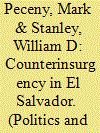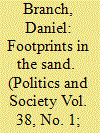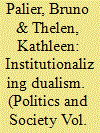|
|
|
Sort Order |
|
|
|
Items / Page
|
|
|
|
|
|
|
| Srl | Item |
| 1 |
ID:
094748


|
|
|
|
|
| Publication |
2010.
|
| Summary/Abstract |
Contemporary U.S. policy makers often characterize the U.S. counterinsurgency experience in El Salvador as a successful model to be followed in other contexts. This article argues that these characterizations significantly overstate the positive lessons of El Salvador, and ignore important cautionary implications. During the first part of the conflict, neither the Armed Forces of El Salvador (FAES) nor the U.S. followed the tenets of counterinsurgency doctrine. The FAES killed tens of thousands of non-combatants in 1979 and 1980, before the civil war even began. This repression may have preempted an incipient popular insurrection, but it also locked in a determined social base that enabled the armed left to build a highly effective and sustained insurgency. In 1984, the U.S. had to save the FAES from likely defeat through a major increase in military aid, especially airpower. When the Farabundo Martí National Liberation Front (FMLN) switched to a classical guerrilla strategy, the FAES, despite considerable U.S. aid, seldom followed best practices in counterinsurgency. Democratization and redistributional reforms were partial and flawed in implementation. The war settled into a stalemate that would likely have continued indefinitely had it not been for the collapse of the socialist bloc and significant changes in the interests of Salvadoran elites that were largely incidental to U.S. policies.The most important cautionary lesson is that indiscriminate violence against civilians early in a conflict can create dynamics that are very difficult to overcome in subsequent stages.
|
|
|
|
|
|
|
|
|
|
|
|
|
|
|
|
| 2 |
ID:
094746


|
|
|
|
|
| Publication |
2010.
|
| Summary/Abstract |
Counterinsurgency doctrine emerged in the early 1960s as the Kennedy administration sought a politically progressive alternative to "pacification" campaigns waged by the French against the Vietnamese revolution. But its architects could not come up with a substitute for the conventional military reliance on massive firepower, which brought devastation to the Vietnamese people and failed to crush the "Viet Cong." The Americans were again unsuccessful in transferring legitimacy to their allies in Saigon. After the war, the notion of counterinsurgency was kept alive among military writers. Rechristened as "COIN," it has been given the task of providing cover for further "dirty wars" in Iraq and Afghanistan.
|
|
|
|
|
|
|
|
|
|
|
|
|
|
|
|
| 3 |
ID:
094745


|
|
|
|
|
| Publication |
2010.
|
| Summary/Abstract |
Recent attempts to revive counterinsurgency strategies for use in Afghanistan and Iraq have been marked by a determination to learn lessons from history. Using the case of the campaign against the Mau Mau insurgency in Kenya of 1952-60, this article considers the reasons for this engagement with the past and the issues that have emerged as a consequence. The article disputes the lessons from British colonial history that have been learned by military planners, most obviously the characterization of nonmilitary forms of British counterinsurgency as nonviolent. Although it contests some of these supposed precedents for successful counterinsurgency in British military history, the article also identifies more generalizable elements of the Kenyan case. Particular emphasis is given to the effects on the nature of counterinsurgency, a reliance on locally recruited allies, and the decentralization of command.
|
|
|
|
|
|
|
|
|
|
|
|
|
|
|
|
| 4 |
ID:
094751


|
|
|
|
|
| Publication |
2010.
|
| Summary/Abstract |
The French and German political economies have been significantly reconfigured over the past two decades. Although the changes have often been more piecemeal than revolutionary, their cumulative effects are profound. The authors characterize the changes that have taken place as involving the institutionalization of new forms of dualism and argue that what gives contemporary developments a different character from the past is that dualism is now explicitly underwritten by state policy. They see this outcome as the culmination of a sequence of developments, beginning in the field of industrial relations, moving into labor market dynamics, and finally finding institutional expression in welfare state reforms. Contrary to theoretical accounts that suggest that institutional complementarities support stability and institutional reproduction, the authors argue that the linkages across these realms have helped to translate employer strategies that originated in the realm of industrial relations into a stable, new, and less egalitarian model with state support.
|
|
|
|
|
|
|
|
|
|
|
|
|
|
|
|
| 5 |
ID:
094750


|
|
|
|
|
| Publication |
2010.
|
| Summary/Abstract |
In this article, the author examines Romanian child protection reforms during European Union (EU) accession as a case of externally facilitated modernization aimed at solving acute social problems. The data for this case study came primarily from fifty-three unstructured interviews with civil servants, civil society representatives, and EU officials. The author finds that in a similar manner to other externally driven modernization projects, the belief according to which Western institutions constituted a universal blueprint, applicable regardless of particular contexts and historical legacies, led to unintended consequences. What is more, because the reformers did not envisage that Western institutions might carry their own pathologies, they ended up replicating some of these pathologies. The study suggests that the goal of externally facilitated public policy should not be to create replicas of Western institutions but to spur local innovation that takes advantage of successful Western institutional logics.
|
|
|
|
|
|
|
|
|
|
|
|
|
|
|
|
| 6 |
ID:
094743


|
|
|
|
|
|
|
|